八下Unit9-Have-you-ever-been-to-a-museum第4课时教学设计
八年级英语下册_Unit_9_Have_you_ever_been_to_a_museum复习题(无答案)(新版)人教新目标版

Unit 9 have you ever been to a museum?复习题I.重点词组默写1.科学博物馆___________________________2.游乐场________________________________3.去某个不同的地方 _____________________4.乘地铁 _______________________________5.玩得高兴,过得愉快____________________6.去滑冰 _______________________________7.导致,引导 ___________________________8.搭起帐篷 _____________________________9.以如此快的方式 _______________________10.下象棋 _______________________________11.许多不同种类的…______________________12.鼓励某人做某事 _______________________13.泡一杯茶 _____________________________14.像…一样享受 _________________________15.几次 _________________________________16.特别的主题____________________________17.在公园里走动__________________________18.一次乘舟行程 _________________________19.搭乘;兜风 _________________________20.举行派对,聚会________________________(单数 have a party)21.做笔记 _______________________________22.成千上万的,许许多多的 _______________23.度假 _________________________________24.一方面…,另一方面…______________________________________25.四分之三______________________________26.一个讲英语的国家______________________27.做某事有困难__________________________28.似乎很奇怪____________________________29.最佳时间做某事________________________30.在一个自然环境中 _____________________31.全年,整年 ____________________________32.接近,靠近,在附近 ____________________33.在白天 ________________________________34.在东南亚_______________________________35.介意做某事 ____________________________II. Grammar Focus 默写1.你曾经去过科学博物馆吗?______ you_____ ______ to a science museum?是的,我曾经去过自然博物馆。
洛阳市八年级英语下册Unit9Haveyoueverbeentoamuseum重点归纳笔记

洛阳市八年级英语下册Unit9Haveyoueverbeentoamuseum重点归纳笔记单选题1、—Are you clear about the job of a policeman, Ben?—Yes, to keep people ________ and the society in good order.A.busyB.safeC.luckyD.healthy答案:B试题分析:句意:-你对警察的工作清楚吗,本? -是的,让人安全和社会有秩序。
busy繁忙的;safe安全的;lucky幸运的;healthy健康的。
所以选B。
考点:考查形容词辨析。
2、— ________ you ever ________ to Hong Kong?— Yes, only once.A.Did; goB.Have; goneC.Do; goD.Have; been答案:D句意:——你去过香港吗?——是的,只有一次。
考查时态。
根据答句“Yes, only once.”可知,问句表示“你曾去过香港吗?”表示“曾经去过某地”用“have/has ever been to+地点”。
故选D。
3、—Where is your father, Jack? I haven’t seen him for a long time.—He ________ to Europe and will return next Friday.A.has goneB.has beenC.will goD.went答案:A句意:——杰克,你父亲在哪里?我好久没见到他了。
——他去了欧洲,下周五回来。
考查动词时态。
根据“He...to Europe and will return next Friday.”可知父亲去了欧洲,还没有回来。
所以对方好久没看到杰克的父亲,应用现在完成时,have gone to“去了某地(未回)”符合,故选A。
4、I have to do some think before making a __________. This thing is important for me.A.progressB.noiseC.mistakeD.decision答案:D句意:在做决定之前,我必须考虑一下。
八年级英语下册Unit_9___Have_you_ever_been_to_a_museum过关
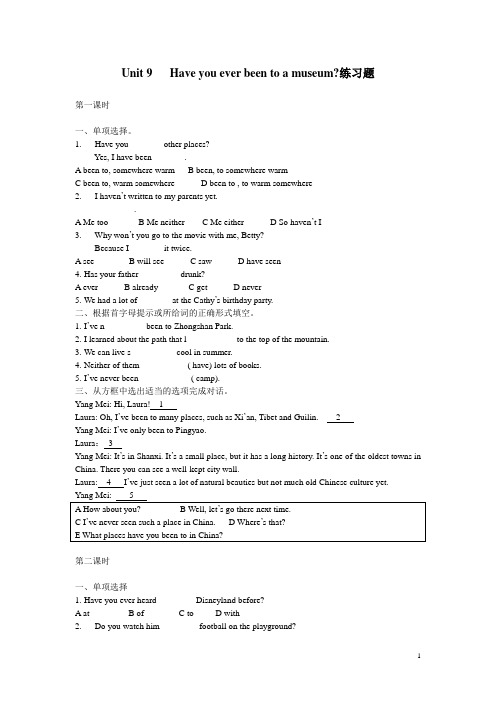
Unit 9 Have you ever been to a museum?练习题第一课时一、单项选择。
1.--- Have you _______ other places?--- Yes, I have been _______.A been to, somewhere warmB been, to somewhere warmC been to, warm somewhereD been to , to warm somewhere2.--- I haven’t written to my parents yet.--- _________.A Me tooB Me neitherC Me eitherD So haven’t I3.--- Why won’t you go to the movie with me, Betty?--- Because I _______ it twice.A seeB will seeC sawD have seen4.Has your father ________- drunk?A everB alreadyC getD never5.We had a lot of _______ at the Cathy’s birthday party.二、根据首字母提示或所给词的正确形式填空。
1.I’ve n_________ been to Zhongshan Park.2.I learned about the path that l___________ to the top of the mountain.3.We can live s__________ cool in summer.4.Neither of them __________ ( have) lots of books.5.I’ve never been ___________ ( camp).三、从方框中选出适当的选项完成对话。
人教新目标英语八年级下册讲义—Unit 9 Have you ever been to a ……

新目标八年级下册Unit 9 Have you ever been to a museum ?讲义一、重点单词1. amusement n. 娱乐; 游戏2. somewhere adv. 在某处; 到某处3. camera n. 照相机; 摄影机; 摄像机4. invention n. 发明物5. invent v. 发明; 创造1. unbelievable adj. 难以置信的; 不真实的2. progress n. 进步; 进展3. rapid adj. 迅速的; 快速的4. unusual adj. 特别的; 不寻常的5. toilet n. 坐便器; 厕所6. encourage v. 鼓励7. social adj. 社会的8. peaceful adj. 和平的; 安宁的9. performance n. 表演; 演出10. perfect adj. 完美的; 完全的11. itself pron.(it的反身代词) 它自己12. collect v. 收集; 采集13. German adj. 德国的; 德语的; 德国人的n. 德语; 德国人14. theme n. 主题15. ride n. 供乘骑的游乐设施; 短途旅程16. province n. 省份17. simply adv. 仅仅; 只; 不过18. fear v. & n. 害怕; 惧怕19. whether conj. 不管......;还是); 或者......(或者); 是否20. Indian adj.印度的 n. 印度人21. Japanese adj.;日本的; 日本人的; 日语的n. 日本人; 日语22. equator n. 赤道23. whenever conj. 在任何......时候; 无论何时24. spring n. 春天25. mostly adv. 主要地; 通常26. location n. 地点; 位置二、短语归纳1.at night在夜晚2.in a more natural environment在一个更加自然的环境中3.all year round 全年4.be far from 离……远5.in the dark 在黑暗中6.in the past 在过去7.have been to sp. 去过某地8.science museum 科学博物馆9.history museum 历史博物馆10.amusement park 游乐园11.go somewhere different 去不同的地方12.go skating 去滑冰13.take the subway 坐地铁14.a great way to spend a Saturday afternoon一个过周六下午的好方法15.all the old movie cameras所有的古老的电影摄影机16.learn about sth.解有关……的情况17.on the weekend 在周末18.camp in the mountains 在大山里露营19.put up a tent搭帐篷20.in such a rapid way 以如此迅猛的方式21.different kinds of各种各样的22.development of toilets 厕所的发展23.social groups 社会团体24.the tea art performances茶艺表演25.make a perfect cup of tea with beautiful tea sets用漂亮的茶具沏一杯完美的茶26.a nice place to enjoy tea 一个品茶的好地方27.thousands of 数以千计的28.International Museum of Toilets国际厕所博物馆29.the Terracotta Army 兵马俑30.Southeast Asia东南亚31.Night Safari 夜间动物园32.three quarters 四分之三33.an English-speaking country一个讲英语的国家34.have problem doing sth. 做某事很困难35.during the daytime在白天36.a couple of times 好几次37.right now 现在;目前38.an amusement park with a special theme一个有特别的主题的游乐园39.walk around the park 在公园里到处走40.hear of 听说41.take a ride兜风42.another province另一个省43.the Bird’s Nest鸟巢44.encourage sb. to do sth.鼓励某人做某事45.on the one hand... on the other hand.一方面,另一方面三、句型集萃1.a great way to do sth一个做某事的好办法2.It’s unbelievable that很难相信……3.watch sb do sth.看某人做了某事4.encourage sb to do sth鼓励某人做某事5.as..as和。
人教版八下 unit_9_Have_you_ever_been_to_a_museum.SectionA
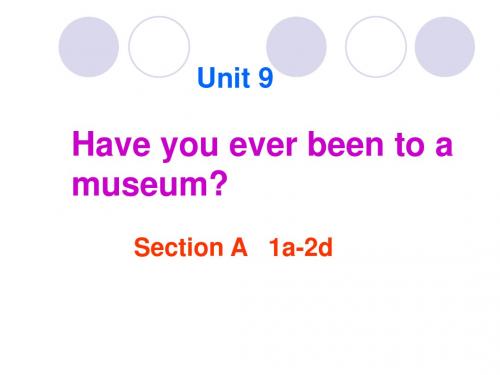
amusement park
water park
bookshop
A: Have you ever been to a…? B: Yes, I’ve been to a... A: A: I’ve Me, also too. been to a...
A: Have you ever been to ...? B: No, I’ve never been to … A: Me I’veneither. never been to ...
Conversation 2 Linda has been to the amusement park. T / F Linda went to the amusement park yesterday . T / F Linda is going to the amusement park again by bike. T / F
Make up a conversation:
Has Dick /Lucy ever been to …? Yes, he /she has. / No, he / she hasn’t. Me too. /Me, neither.
1a Which of these places would you like to visit? Rank them from 1 to 5.
你曾经去过…吗?
A: Have you ever been to a beach? B: Yes, I have.
the Great Wall
A: Have you ever been to …? B: No, I haven’t.
zoo
A: Have you ever been to a zoo? B: Yes, I’ve been to a zoo.
八年级英语下册Unit_9_Have_you_ever_been_to_museum_讲解+练习题目+答案

Unit9 知识点和练习附详细参考答案1. invent(1)invent 作动词,意为“发明;创造”。
例如:Edison invented the light bulb. 爱迪生发明了电灯。
(2)invent还可以表示“虚构”。
例如:The whole story was invented. 整个故事是虚构的。
(3)invent的名词形式有两个,一个是inventor(发明者;发明家),另一个是invention (发明物)。
例如:Edison is a great inventor in history.爱迪生是历史上伟大的发明家。
Human history is also a history of great inventions.人类的历史也是一个伟大发明的历史。
【拓展】invent和discover的辨析:(1)invent 意为“发明,发明之物”指“从无到有”。
例如:Alexander Graham Bell invented the telephone in 1876.亚历山大•格雷厄姆•贝尔在1876年发明了电话。
(2)discover 意为“发现”,指“本来就已经存在,但不为人知”的事物。
例如:Columbus discovered America in 1492. 哥伦布在1492年发现了美洲。
2. unbelievableunbelievable作形容词,意为“难以置信的;不真实的”,是由believable“可相信的;可信任的”加否定前缀un-派生而来的。
其动词形式为believe,意为“相信;以为”。
例如:It's unbelievable that you are a writer. 我难相信你是一个作家。
【拓展】un-是个前缀,意为“不”。
例如:happy“高兴的”— unhappy“不高兴的”;lucky“幸运的”— unlucky“不幸的”;important“重要的”— unimportant;“不重要的”;healthy“健康的”— unhealthy“不健康的”。
2015年新目标人教版八年级英语下册Unit9--Have-you-ever-been-to-a-m

A: Have you ever been to the Great Wall? B: No, I haven’t. What about you? A: Me neither. =Neither have I. =I haven’t been there, either. Neither+助动词/be动词/情态动词+主语.
4c. Answer the survey questions and then ask your partner.
Have you ever… You
been to another province in China? Lost something important?
Your partner
1.He ___h_a_s__ (have) ever been to Shanghai. 2.She _w__e_n_t___ (go) to the zoo last week. 3.I __h_a_v_e___ (have) ever been to Hong Kong. 4.They __h_a_v_e_n_’_t___ (not have) been to the 5. Great Wall. 5.A: ___H_a_s____ (have) she ever been to China?
1 have / has been to +地名 去过某地(去过已回来);
2 have / has gone to +地名 去了某地(还没回来);
3 have / has been in +地名 在某地住了有多长。
A: Have you ever been to the Great Wall? B:Yes, I have. What about you? A: Me too. =So have I. =I have ever been there, too. So+助动词/be动词/情态动词+主语.
2014春人教新目标八下unit9_have_you_ever_been_to_a_museum__Section_A_3

你曾经去过科学博物馆吗?
Have you ever been to a science museum?
是的,我去过科学博物馆。/不,我从未去过科学 博物馆。
Yes, I’ve been to a science museum./ No, I’ve never been to a science museum.
构成:have(助动词) + p.p has(第三人称单数助动词) + p.p
疑问式
回答
Have I/you finished the work? Has he/she finished the work?
Yes, you/I have. No, you/I haven’t. Yes, he/she has. No, he/she பைடு நூலகம்asn’t.
have not 常缩略为 haven’t。 has not 常缩略为 hasn’t。
Have you had your 表示过去发生或已 lunch yet? 经完成的动作对现
Yes, I have. I have 不饿了)
在造成的影响或结
just had it. (现在我 果。
I have already taught him some English. John has never been to the space museum. My boy has just started junior high school.
I. 根据括号内的要求完成下列各句,每 空一词(含缩写)。 1. My parents have come back already. (改为否定句) My parents _______ haven’t ______ come back ____. yet 2. The boys have been to Japan lots of times. (改为一般疑问句) _______ Have the boys _______ been to Japan lots of times?
人教版英语八下U9Have you ever been to a museum 讲义

Unit9 Have you ever been to a museum?一、重点词汇及拓展1. amusement n. 娱乐;游戏e.g. The old ladies played the games just for amusement.老太太们玩这个游戏只是为了取乐。
amuse v. 消遣,逗笑;使开心,使愉快amusing adj. 有趣的,好玩的,好笑的amused adj. 被逗乐的;感到好笑的2.amusement park 游乐场e.g. The amusement park is open from May through October.游乐园从五月到十月开放。
3.somewhere adv. 在何处;到某处pron. 某个地方e.g. Maybe the keys are somewhere in the dining room.也许钥匙在餐厅某个地方。
I need to find somewhere to stay tonight.我得找到今晚要住的地方。
4.camera n.照相机;摄影机;摄像机e.g. I heard your parents bought you a cameras as a gift.我听说你的父母亲给你买了一台照相机作为礼物。
5.invention n.发明;发明物e.g. Do you think mobile phone is a great invention?你认为手机是一个伟大的发明吗?6.invent v.发明;创造inventor n.发明家invention n.发明;发明物e.g. As we all know that Edison invented light bulb.我们都知道爱迪生发明了灯泡。
7. unbelievable adj. 难以置信的;不真实的unbelievably adv. 难以置信地;不真实地unbelievably bad/good 坏得/好得令人难以置信incredible adj. 难以置信的e.g. I still find this story both fascinating and unbelievable.我仍然觉得这个故事非常有趣和难以置信。
八年级英语下册-Unit-9-Have-you-ever-been-to-a-museum全单元课件

Conversation 3
1. Frank had a great time at the water park. T/F 2. Frank’s friend has never been to the water
park. T/F 3. Frank and his friend are going skating. T/F
great way to spend a Saturday afternoon. Jill: Yes, I love all the old movie cameras
there. I learned about the inventions that led to color movies, too.
Anna: So, what did you do on the weekend? Jill: I camped in the mountains with some
friends. We put up a tent and cooked outside. Anna: That sounds fun. I’ve never been camping. Jill: You should try it!
2. What can we learn at the International Museum of Toilets?
The museum teaches people about the history and development of toilets. It also encourages governments and social groups to think about ways to improve toilets in the future.
八下新目标英语Unit_9_Have_you_ever_been_to_a_museum?

【2012贵州贵阳】 “Have you ever been to Tokyo?” “Yes, I ______ there twice. It’s a modern city.”
A. have gone B. have been C. had gone
【答案】B
考查动词时态及动词的用法。问句用的是现 在完成时,答句也应该用现在完成时,前后 时态一致。have gone意为“去过,但还没回 来”;have been意为“去了,回来了”。根 据句意:你去过东京吗?我去过两次,它是 一个现代城市。故选B.
the final.
— I think so. He ________ for it for months.
A. is preparing
B. was preparing
C. had been preparing
D. has been preparing
2. By the time he realizes he _________ into a
D. Did; show
8. — Hi, Tracy, you look pale.
— I am tired. I ______ the living room all day.
A. painted
B. had painted
C. have been painting D. have painted
C. considered D. is going to consider
7. —______ you ______ him around the museum
yet?
—Yes. We had a great time there.
A. Have ; shown
人教版 八年级英语 下册 Unit_9_Have_you_ever_been_to_a_museum

dish.
Tapescripts:
Boy 1: So, Peter, how long have you been in China? Peter: I’ve been here for two weeks, but I’m going back to Australia tomorrow. Boy 1: Have you traveled much? Peter: Yes, I have. I’ve seen many interesting things. Boy 1: Have you visited the Palace Museum? Peter: Yes, I have. I went there last week. It was wonderful. There were so many beautiful treasures. Boy 1: And have you been to the Great Wall?
1st listening
1b
Listen to a student interviewing a foreign student. Check (√) the questions you hear.
___√_ Have you visited the Palace Museum?
___√_ Have you been to the Great Wall?
人教版八年级英语下册Unit9 Have you ever been to a museum知识点梳理及单元复习
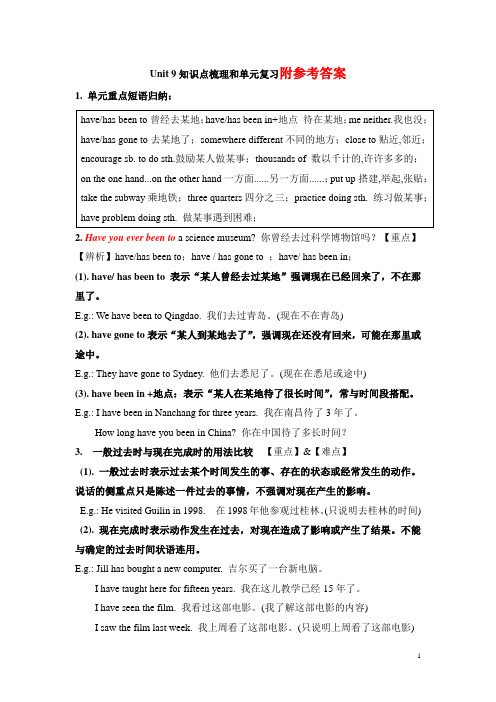
Unit 9知识点梳理和单元复习附参考答案1. 单元重点短语归纳:have/has been to曾经去某地;have/has been in+地点待在某地;me neither.我也没;have/has gone to去某地了;somewhere different不同的地方;close to贴近,邻近;encourage sb. to do sth.鼓励某人做某事;thousands of 数以千计的,许许多多的;on the one hand...on the other hand一方面......另一方面......;put up搭建,举起,张贴;take the subway乘地铁;three quarters四分之三;practice doing sth. 练习做某事;have problem doing sth. 做某事遇到困难;2. Have you ever been to a science museum? 你曾经去过科学博物馆吗?【重点】【辨析】have/has been to;have / has gone to ;have/ has been in;(1). have/ has been to 表示“某人曾经去过某地”强调现在已经回来了,不在那里了。
E.g.: We have been to Qingdao. 我们去过青岛。
(现在不在青岛)(2). have gone to表示“某人到某地去了”,强调现在还没有回来,可能在那里或途中。
E.g.: They have gone to Sydney. 他们去悉尼了。
(现在在悉尼或途中)(3). have been in +地点:表示“某人在某地待了很长时间”,常与时间段搭配。
E.g.: I have been in Nanchang for three years. 我在南昌待了3年了。
How long have you been in China? 你在中国待了多长时间?3. 一般过去时与现在完成时的用法比较【重点】&【难点】(1). 一般过去时表示过去某个时间发生的事、存在的状态或经常发生的动作。
2014春人教新目标八下unit9_have_you_ever_been_to_a_museum__Section_B_1

1c Listen again and take notes.
Name: _____________________________ Peter
Country: ____________________________ Australia
How long in China: ____________________ two weeks
The statements below are 2c false. Use information from the article to correct them.
1. Most people in Singapore only speak English. both English and Chinese 2. It is not easy to get many different kinds of good food in Singapore. very
Singerapore ---A Place You will never forget! Have you ever been to Singapore?For thousands of tourists from China,this small island in Southeast Asia is a woundfull and safe place to take the holiday .on the one hand, more than three quarters of the population are Chinese, so you can simply speak Putonghua a lot of the time.on the other hand,Singapore is an Englishspeaking country,So it’s also a good place to pratice your English.
八年级英语下册 Unit 9 Have you ever been to a museum语法专题—

3.—Have you seen Dr.Qian recently? —No.He _C___ Japan for an important meeting.He'll come back next week. A.has gone B.has been to C.has gone to D.has been 4.—Have you __C__ been to Guangxi? —Yes,I have.I ________ there last summer. A.ever;go B.never;went C.ever;went D.never;go
第8页
9.We went to the science museum last week.(对画线部分提问) ___W__h_e_n__d_id___ you __g_o_ to the science museum? 10.My parents have been to the Great Wall.(对画线部分提问) __W__h_e_r_e_h_a_v_e__ your parents__b_e_e_n___?
第9页
三、依据对话内容,用have/has been(to)或have/has gone(to)填空。 A:Hi,Roger! Where is everybody?The house is very quiet. B:Well,Mom 11.__h_a_s__g_o_n_e_t_o____ the cinema with Jane. A:How about your sister? B:She's taking a shower right now because she 12.__h_a_s_b_e_e_n__to__ the gym(健身房). A:I 13._h__a_ve__b_e_e_n_t_o__ the gym twice this week.It's really tiring.
【人教英语】八下Unit 9 Have you ever been to a museum课文重难点详解 Section A
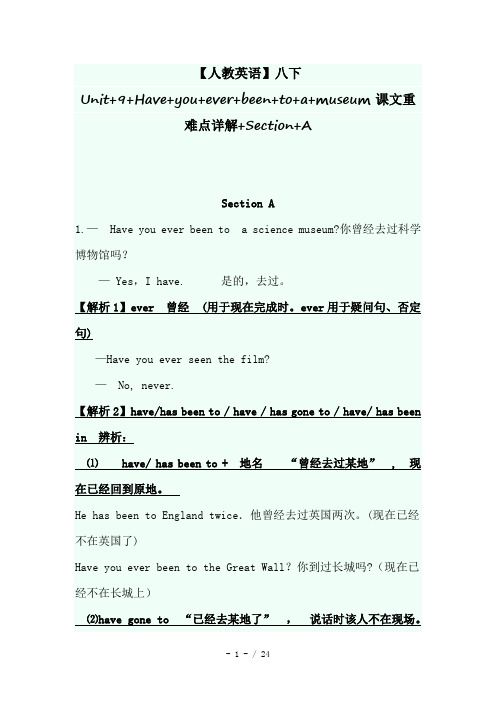
【人教英语】八下Unit+9+Have+you+ever+been+to+a+museum课文重难点详解+Section+ASection A1.—Have you ever been to a science museum?你曾经去过科学博物馆吗?— Yes,I have. 是的,去过。
【解析1】ever 曾经(用于现在完成时。
ever用于疑问句、否定句)—Have you ever seen the film?—No, never.【解析2】have/has been to / have / has gone to / have/ has been in 辨析:⑴have/ has been to + 地名“曾经去过某地”, 现在已经回到原地。
He has been to England twice.他曾经去过英国两次。
(现在已经不在英国了)Have you ever been to the Great Wall?你到过长城吗?(现在已经不在长城上)⑵have gone to“已经去某地了”,说话时该人不在现场。
He has gone to England。
他已去英国了。
(已经不在说话的地方,到达英国或者在去英国的路上)( ) Mary isn’t here. She has ____ the shop.A. been toB. went toC. gone toD. /【2013江苏中考1】A number of tourists ____ Yangzhou many times because it is such a beautiful city.A. have been toB. has been toC. has gone toD. have gone to⑶have been in +地点待在某地,常与时间段搭配。
I have been in Shanghai for three years.2. Me neither 我也没有。
河南省八年级英语下册Unit9Haveyoueverbeentoamuseum解题方法技巧

河南省八年级英语下册Unit9Haveyoueverbeentoamuseum解题方法技巧单选题1、—Hi, Tom! _________ you ever _________ the Bird’s Nest?—Yes, I have. It’s fantastic.A.Have; been toB.Have; gone toC.Did; go to答案:A句意:——嗨!汤姆!你去过鸟巢吗?——是的,我去过。
那太棒了!考查现在完成时。
由答语“Yes, I have.”可知,问句用现在完成时,排除C项;have been to表示“曾经去过某地(现在已经回来了)”;have gone to表示“去了某地(还没有回来)”。
分析语境可知,此处是问“你曾经去过鸟巢吗?”,应用have been to。
故选A。
2、—Do you like English?—Yes, but I think__________ is a great challenge to learn the language well.A.thatB.thisC.it答案:C句意:——你喜欢英语么?——是的,但是我认为把语言学好是一种挑战。
考查代词。
that那个;this这个;it它。
think后是省略that的宾语从句,不定式“to learn the language well”是从句的真正的主语,此处用it做宾语从句的形式主语。
故选C。
3、—Where’s your English teacher?— She ________ to Beijing. She’ll be back in a week.A.has beenB.has goneC.goesD.went答案:B句意:——你的英语老师在哪儿?——她去了北京。
她将在一周后回来。
考查动词时态。
have been to…“去过某地”;have gone to…“去了某地”,根据“She’ll be back in a week.”可知,她去了北京,现在不在这儿,用“have/has gone to +地点”来表示。
新02014春人教新目标八下unit9_have_you_ever_been_to_a_museum_Section_A_1

(B)2. —_____ you ever _____ to a park?
—No, I haven’t.
A. Did, go
C. Will, be
B. Have, Байду номын сангаасeen
(A )3. —_____Tom ______ this book before? —Yes, he has. A. Has, read B. Does, read C. Will, read (B )4. — Where is your mother? —She _______ to New York. A. have gone B. has gone C. has been
I went to these places before, so I can say
I have been to a water park.
I have been to a space museum.
Have you ever been to a history museum? No, I haven’t.
Me neither. Let’s go to one tomorrow.
【点拨】have gone to去了 某地,表示说话时此人不 在现场;have been to去过 某地,表示说话时 此人已回到说话的地方。
3. —Where’s Zhang Peng? gone to (go) to our math —He has ___________ teacher’s office. 4. —What have you ________ studied (study) in this school? —Many things.
1b
Listening
八年级英语下册Unit9Haveyoueverbeentoamuseum英语说课稿

八年级英语下册Unit+9+Have+you+ever+been+to+a+museum英语说课稿一、教材分析:1、教学内容:本单元是Go for it ( 下) Unit 9。
主要围绕“Have you ever been to a museum?”这一主题展开各种教学活动,并以这一主题引出现在完成时的一般疑问句,否定句以及特殊疑问句等语言功能。
本单元旨在创造一个轻松、愉快的学习、交流环境,通过听、说、读、写来培养学生综合运用这些知识的能力。
并让学生能在“做中学”(l earning by doing),通过有限的课堂实践活动,拓展以往的经历,能准确地用英语来表达。
2、教材的地位和作用:八年级下九单元Have you ever been to a museum?讲述的是现在完成时的用法,这是初中非常重要的时态之一。
学生们能够用现在完成时来表达自己的经历,来体会别人的感受是很重要的。
这个单元一定要体会现在完成时的真正含义和用法。
要避免混淆几个重点词组的使用。
我们更要使学生不仅理解枯燥的语法,还要让学生们会用新学的语法知识来表达思想。
3、教材的处理:根据《英语课程标准》(实验稿)关于总目标的具体描述,结合本单元这部分的教学内容及基于对教材的分析,我对本单元的内容进行如下处理,目的是突出重点,使课堂节奏紧凑,衔贯。
本单元分为四课时,第一课时是Section A,第二课时是Section B, 第三课时是Self Check, 第四课时是Reading,最后一部分是做练习,以学生的自测为主,然后予以校对。
二、教学目标:根据以上我对本单元教材内容的分析,我确定以下几个为本单元的教学目标:语言知识、语言技能、学习策略、情感态度和文化意识五个方面。
§1.语言知识:本单元要求学生掌握以下词汇(neither, theme, end up, especially, disc over, population, simply, fear, whenever)语言功能:学习和增加阅读技巧和阅读策略。
2020年八年级下册英语讲义:Unit 9 Have you ever been to a museum 语法及写作(新人教目标版)
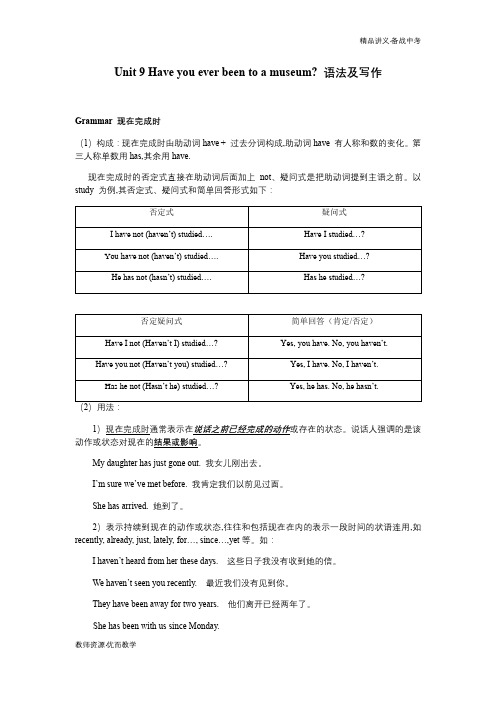
Unit 9 Have you ever been to a museum? 语法及写作Grammar 现在完成时(1)构成:现在完成时由助动词have + 过去分词构成,助动词have 有人称和数的变化。
第三人称单数用has,其余用have.现在完成时的否定式直接在助动词后面加上not、疑问式是把助动词提到主语之前。
以study 为例,其否定式、疑问式和简单回答形式如下:1)现在完成时通常表示在说话之前已经完成的动作或存在的状态。
说话人强调的是该动作或状态对现在的结果或影响。
My daughter has just gone out. 我女儿刚出去。
I’m sure we’ve met before. 我肯定我们以前见过面。
She has arrived. 她到了。
2)表示持续到现在的动作或状态,往往和包括现在在内的表示一段时间的状语连用,如recently, already, just, lately, for…, since…,yet等。
如:I haven’t heard from her these days. 这些日子我没有收到她的信。
We haven’t seen you recently. 最近我们没有见到你。
They have been away for two years. 他们离开已经两年了。
She has been with us since Monday.Exercise:1. I____ already ____ (see) the film. I ________ (see) it last week.2. _____ he ____ (finish) his work today? Not yet.3. My father ____ just ____ (come) back from work. He is tired now.4. Where’s Li Ming ? He __________ (go) to the teacher’s office.5. I __________ (work) here since I ______ (move) here in 1999.6. So far I _______________(make) quite a few friends here.7. How long ________ the Wangs ______________(stay) here ? For two weeks.8. I ________ just ___________ (finish) my homework.9. He ________ (go) to school on foot every day.10.____ you ______ (find) your science book yet?11. If it ____ (be) fine tomorrow, I'll go with you.12. The students ____________ (read) English when the teacher came in.13. Look! The monkey __________ (climb) the tree.14. My mother __________ (come) to see me next Sunday.15. I've lost my pen. _________ you ________ (see) it anywhere?1. have, seen, saw2. Has, finished3. has, come4. has gone5. have worked, moved6. have made7. have, stayed8. have, finished9. goes 10. have, found 11. is 12. were reading 13. is climbing 14. is coming 15. Have, seenAsk the questions1) I have been there for two days.__________ _________ __________ you __________ __________?2) My father has lived here since 2000._________ _________ __________ your father _________ __________?3) He left here yesterday._________ ________ he _________ __________?4) They bought a book two hours ago.__________ ___________ they __________ a book?Keys: 1. How long have, been there 2. How long has, lived here 3. When did, leave here 4. When did, buyUse “never, ever, already, just, yet, for, since” to fill in the blanks.1. I have _______ seen him before, so I have no idea about him.2. Jack has _________ finished his homework.3. Mr. Wang has taught in this school ________ ten years.4. “Have you ________ seen the film?” “No, I have ________ seen it.”5. “Has the bus left _______?” “Yes, it has _________ left.”Keys: 1. never 2. just , already 3. for 4. ever, never 5. yet , just / already作文专题本单元围绕话题“曾经去过的地方”展开,使用现在完成时表达已经做过的事情。
- 1、下载文档前请自行甄别文档内容的完整性,平台不提供额外的编辑、内容补充、找答案等附加服务。
- 2、"仅部分预览"的文档,不可在线预览部分如存在完整性等问题,可反馈申请退款(可完整预览的文档不适用该条件!)。
- 3、如文档侵犯您的权益,请联系客服反馈,我们会尽快为您处理(人工客服工作时间:9:00-18:30)。
初中英语电子备课课时教学设计表学校年级八年级教师课题Unit 9 Have you everbeen to anamusement park?第4课时日期备课项目序号分值首备区域复备区域备课标与教材(10分)1 4分比较分析课标与教材的联系。
一、语言技能:1、Reading: 能读懂Reading,并能从中提取信息:what ?when?, 标出重点的句子;能针对所读语段的内容记录、标记when?信息。
2、Speaking:能有效地理解Have you been to..?.特点和结构;能角色表演1c,2C部分;能根据话题进行一次情景对话;口语活动中做到语音、语调自然,语气恰当(如特殊疑问句应用降调。
)二、语言知识(一)词汇:southeast wonderful holiday quarter three quarterspopulation simply fear brave excellent Indian dark daytimewake wake up fox natural all year round whenever springautumn season awak e 醒着的等词的基本含义以及在本单元第1课对话和听力材料中特定语境中的意义:理解和领悟句型2.句型:Have you ever been to ……?Yes, I have. No, I haven’t.(二)语法:1.学会用have / has been to …谈论曾经去过的地方2.完成时态课文中有一些重点的词组,是学生必须要记住的.2 3分分析语言知识、语言技能训练的呈现方式。
1.3a: 快速阅读reading,理解大意并提取信息: what,when并记录信息2.理解重点词汇及句子3.分角色朗读------语法总结------情景对话设计------课堂训练。
3 3分教学重点和难点一、重点1:朗读reading ,提取信息: what? When?2、阅读理解一直是学生的薄弱环节,在平时的教学中要适当进行训练。
二、难点1. 学习朗读reading, 提取信息: what? when2. 模仿reading完成写作备学情(15分)1 5分学生们对于现在完成时,已经有了比较深入的学习,能够比较正确地运用,这节课里将要学习较长的文章,并根据学习进行写作,在上面几节课的学习基础上,大部分能够用完成时表达曾经去过的地方。
通过前面三个课时的学习,学生对于本单元的句型已经有了很深的理解,本课时主要是提高学生的阅读能力。
2 5分教师通过幻灯片展示S、Pt.让小组交流、展示、PK 、评价使学生进行流利、准确或基本三个层次的练习。
教师积极评价。
3 5分在学习的过程中,基础比较好的学生,接受能力较强,基础较差的学生,接受能力较弱,需要多指导和帮助,特别是要发挥一帮一的作用。
两极分化严重实行分层教学以促进学习积极性。
备教学目标(15分)1 5分1-15名学生能基本复述reading并掌握其中重点词句。
16-30名学生能理解reading,并能完成相应练习。
31-39名学生能基本掌握重点句子,基本理解reading。
2 5分本课主要通过速度、略读等阅读方法让学生学习理解文章,听录音齐读,同桌交流或小组交流来学会如何学习并使用英语,让学生进行大量的读写的练习。
3 5分通过对文章的了解,让学生体会帮助别人的乐趣,学会互相帮助。
备教学方法与媒体(15分)1 5分多媒体和录音机教法:任务型教学法学法:合作式学习法、观察发现法讨论学习法、探索学习法2 10分教学流程(35分)1 5分Step 1课前表演目标:学生能够表述出自己的礼物。
步骤:1.三组学生表演。
2.评价得分。
Step 2 Greetings and RevisionGreet the class as usual and check the homework.Have students show their written work.Step 3 New wordsLearn the new words.Show the new words on the screen. Teach the newwords and ask students to repeat the new words severaltime.Step 4 3aT: OK. Open your books and turn to Page 72. Look atthe two pictures. The girl is Mei Shan and the boyis David Feng. They each wrote a paragraph abouttheir school — the Hilltop Language School. Readthe two paragraphs and find out the answers to thequestions below them.(After reading, ask some students to work in pairs.)S1: What does Mei Shan do?S2: She is a flight attendant.S3: How long has she had the job?S4: She has had the job for two years.S5: …S6: …Suggested answers to the rest of the questions:3. She wanted to travel.4. She studied English for five years.5. David wants to be a tour guide.6. No, he has never.7. He’s been a student for one year.8. He might become an English teacher instead.Step 5 3b and 3cThis activity provides guided writing practice using thetarget language.We’ve known some information about two students’school. Now it’s our turn to write articles aboutourselves. The information below and in 3a mayhelp you. If you have difficulty in doing it, you candiscuss each other.Step 5 4Find someone who …This activity provides listening, speaking and writing各组之间进行对话练习培养参与意识。
2 10分3 5分4 5分5 10分practice using the target language.Read the instructions to the class. Turn to Page 88 andtell the students they can ask and answer questionsusing the words “Have you ever…?” They will havefive minutes to find as many answers as they can.Point out the example in the speech bubbles and havetwo students read it to the class.Give students five minutes to move around the roomasking and answering questions.Then discuss the answers with the class. Ask about thelist of items one by one and have students raise theirhands if they have done the thing you just read.Step 6 Optional ActivityAsk some students to make up their own list of Haveyou ever … questions and do their own survey. They canwrite up the results in interview form, as a list ofquestions and answers using their own name and theother student’s name like this:Carlos: Have you ever seen a white elephant?Maria: No, I haven’t.Step 7 SummaryIn this class we’ve done some writing practice using thetarget language. Read the paragraph in Activity 3aagain.Step 8 Homework1.基础题:熟读短文并能熟练回答问题。
2.探究题:小组讨论写出作文P72 3b教学反思:通过教学,学生们明确了本课时的教学重点,能顺利的回答出文章后面的问题且能模仿3a完成3b中的作文写作。
